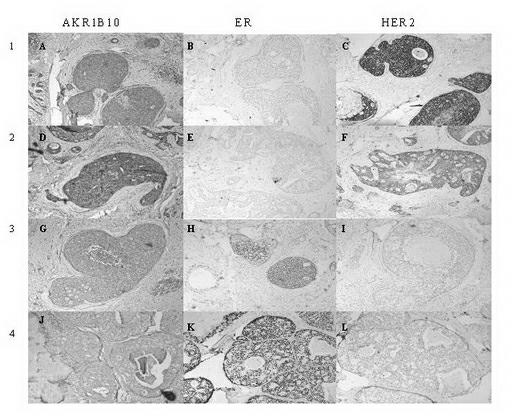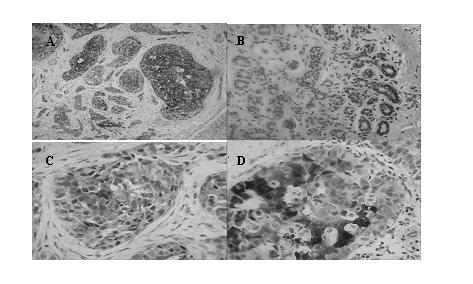AKR1B10 (aldo-keto reductase family 1 B10) gene protein as breast cancer diagnostic marker and drug target
A diagnostic marker, breast cancer technology, applied in the field of medical biology, can solve the problem of not directly guiding treatment or indicating the sensitivity of chemotherapy drugs
- Summary
- Abstract
- Description
- Claims
- Application Information
AI Technical Summary
Problems solved by technology
Method used
Image
Examples
Embodiment Construction
[0028] In view of the fact that the expression of the AKR1B10 gene protein in breast ductal carcinoma in situ is positively correlated with the expression of HER2 and negatively correlated with the expression of ER, the application of this gene protein can be made into a diagnostic preparation for breast cancer through conventional technical means; it can also be used clinically It is used for pathological diagnosis and prognosis assessment of breast ductal carcinoma in situ, and can also be used as a potential target for breast cancer treatment. For specific drug preparation, please refer to the preparation method of related dosage forms of aldose reductase inhibitors such as torristat.
PUM
 Login to View More
Login to View More Abstract
Description
Claims
Application Information
 Login to View More
Login to View More - Generate Ideas
- Intellectual Property
- Life Sciences
- Materials
- Tech Scout
- Unparalleled Data Quality
- Higher Quality Content
- 60% Fewer Hallucinations
Browse by: Latest US Patents, China's latest patents, Technical Efficacy Thesaurus, Application Domain, Technology Topic, Popular Technical Reports.
© 2025 PatSnap. All rights reserved.Legal|Privacy policy|Modern Slavery Act Transparency Statement|Sitemap|About US| Contact US: help@patsnap.com


